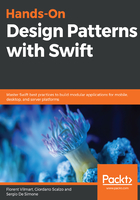
上QQ阅读APP看书,第一时间看更新
Initialization and mutability
Dictionaries are value types, and they follow the same mutability and initialization as other value types.
Let's use some important dates—the release dates for Swift—to work with dictionaries:
let swiftReleases = [
"2014-09-09": "Swift 1.0",
"2014-10-22": "Swift 1.1",
"2015-04-08": "Swift 1.2",
"2015-09-21": "Swift 2.0",
"2016-09-13": "Swift 3.0",
"2017-09-19": "Swift 4.0",
"2018-03-29": "Swift 4.1",
"2018-09-17": "Swift 4.2"
] // Swift release dates, source Wikipedia
As you can see, the dictionary type is quite simple; it's Dictionary<String, String>, which we can also denote as [String: String].
Similar to the Array and other value types, using the let keyword makes the dictionary immutable, which means the following:
- You cannot replace the contents of swiftReleases with a new dictionary
- You cannot add another key/value pair
- You cannot remove an existing key/value pair
- You cannot replace an existing key/value pair
- You cannot use any function or method that have an effect from above
While having the release date as a string is practical for writing the code, it becomes quite impractical if we want to do any kind of date comparison or computation.
In the next sections, we'll explore what we can do with dictionaries.